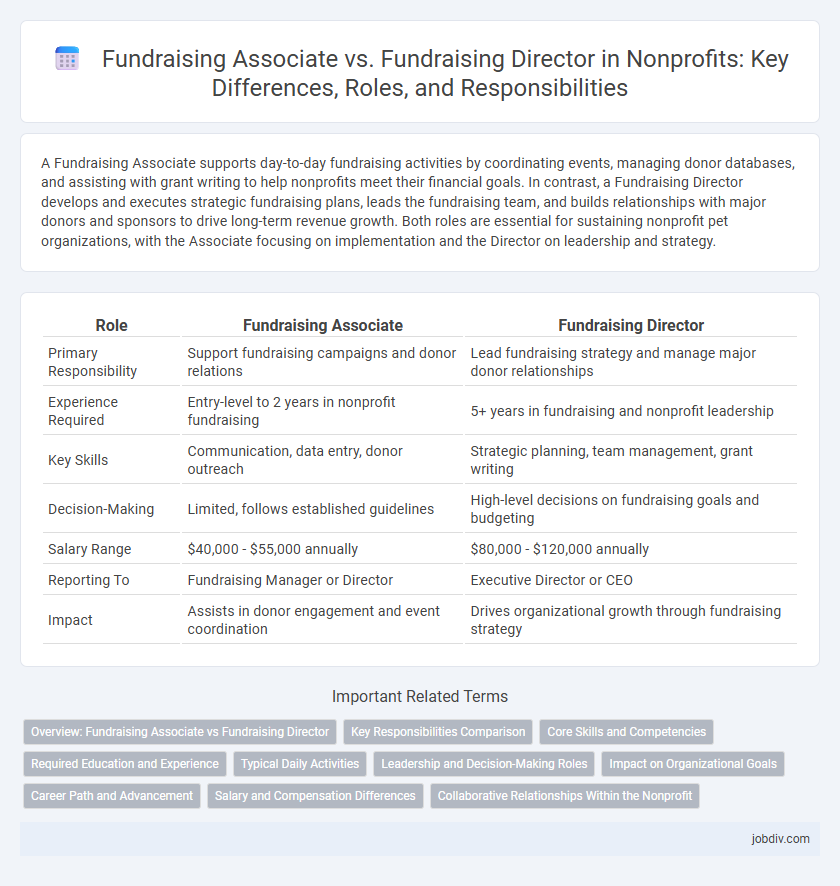A Fundraising Associate supports day-to-day fundraising activities by coordinating events, managing donor databases, and assisting with grant writing to help nonprofits meet their financial goals. In contrast, a Fundraising Director develops and executes strategic fundraising plans, leads the fundraising team, and builds relationships with major donors and sponsors to drive long-term revenue growth. Both roles are essential for sustaining nonprofit pet organizations, with the Associate focusing on implementation and the Director on leadership and strategy.
Table of Comparison
| Role | Fundraising Associate | Fundraising Director |
|---|---|---|
| Primary Responsibility | Support fundraising campaigns and donor relations | Lead fundraising strategy and manage major donor relationships |
| Experience Required | Entry-level to 2 years in nonprofit fundraising | 5+ years in fundraising and nonprofit leadership |
| Key Skills | Communication, data entry, donor outreach | Strategic planning, team management, grant writing |
| Decision-Making | Limited, follows established guidelines | High-level decisions on fundraising goals and budgeting |
| Salary Range | $40,000 - $55,000 annually | $80,000 - $120,000 annually |
| Reporting To | Fundraising Manager or Director | Executive Director or CEO |
| Impact | Assists in donor engagement and event coordination | Drives organizational growth through fundraising strategy |
Overview: Fundraising Associate vs Fundraising Director
A Fundraising Associate primarily supports the execution of fundraising campaigns and manages donor communications, while a Fundraising Director oversees strategic planning and leadership of the entire fundraising department. The Director sets financial goals, cultivates major donor relationships, and ensures alignment with the nonprofit's mission and long-term fundraising objectives. In contrast, the Associate handles day-to-day operational tasks, database management, and event coordination to sustain ongoing donor engagement.
Key Responsibilities Comparison
Fundraising Associates primarily manage donor communications, organize fundraising events, and support grant writing to ensure steady revenue streams for nonprofits. Fundraising Directors oversee comprehensive fundraising strategies, develop major donor relationships, and lead staff to meet ambitious financial goals. While Associates handle operational tasks, Directors focus on strategic planning and higher-level stakeholder engagement.
Core Skills and Competencies
Fundraising Associates excel in donor engagement, database management, and event coordination, showcasing strong communication and organizational skills essential for executing fundraising campaigns. Fundraising Directors demonstrate strategic leadership, advanced donor relationship management, and comprehensive knowledge of fundraising regulations and budgeting, driving high-level campaign planning and team supervision. Both roles require proficiency in CRM software, data analysis, and storytelling to maximize donor contributions and advance nonprofit missions.
Required Education and Experience
Fundraising Associates typically require a bachelor's degree in nonprofit management, communications, or related fields along with 1-3 years of experience in fundraising or donor relations. Fundraising Directors often hold advanced degrees such as a Master's in Nonprofit Leadership or Business Administration, coupled with 5-7 years of progressive experience leading fundraising campaigns and managing development teams. Both roles demand strong skills in donor cultivation, grant writing, and strategic planning, but Directors are expected to demonstrate leadership in budget management and high-level stakeholder engagement.
Typical Daily Activities
Fundraising Associates primarily manage donor outreach, organize fundraising events, and maintain accurate records in donor databases to support campaign goals. Fundraising Directors develop strategic fundraising plans, cultivate major donor relationships, and oversee the fundraising team to ensure targets are consistently met. Both roles require strong communication skills but differ in scope, with Associates focusing on execution and Directors on leadership and strategy.
Leadership and Decision-Making Roles
Fundraising Directors lead strategic planning, oversee budget allocation, and make high-level decisions that drive nonprofit growth and sustainability. Fundraising Associates support campaign execution, coordinate donor communications, and provide valuable data for informed decision-making. Leadership in the director role ensures alignment with organizational goals, while associates execute tasks that enable effective fundraising operations.
Impact on Organizational Goals
A Fundraising Associate supports organizational goals by executing donor outreach, managing event logistics, and maintaining donor databases to ensure steady revenue streams. In contrast, a Fundraising Director shapes strategic fundraising plans, cultivates high-level donor relationships, and aligns campaigns with long-term organizational objectives to maximize financial growth. Effective collaboration between both roles enhances resource mobilization and drives sustained mission impact.
Career Path and Advancement
Fundraising Associate roles focus on executing campaigns, managing donor relations, and supporting event logistics, offering foundational experience in nonprofit resource development. Career advancement often leads to Fundraising Director positions, which encompass strategic planning, team leadership, and high-level stakeholder engagement to drive organizational revenue goals. Progression from associate to director typically requires proven fundraising success, strong communication skills, and a deep understanding of nonprofit financial management.
Salary and Compensation Differences
Fundraising Directors typically earn significantly higher salaries than Fundraising Associates, with directors averaging $70,000 to $100,000 annually compared to associates who generally make between $40,000 and $55,000. Compensation differences also include directors receiving bonuses, benefits, and performance incentives not commonly available to associates. Experience level, organizational size, and geographic location further impact salary disparities within nonprofit fundraising roles.
Collaborative Relationships Within the Nonprofit
Fundraising Associates support the development of donor relationships through direct engagement and data management, ensuring timely communication and personalized outreach. Fundraising Directors oversee strategic partnership building by coordinating cross-departmental collaboration and leveraging board members' networks to maximize fundraising potential. Both roles require effective teamwork and shared goals to strengthen the nonprofit's donor base and drive successful campaign outcomes.
Fundraising Associate vs Fundraising Director Infographic

 jobdiv.com
jobdiv.com